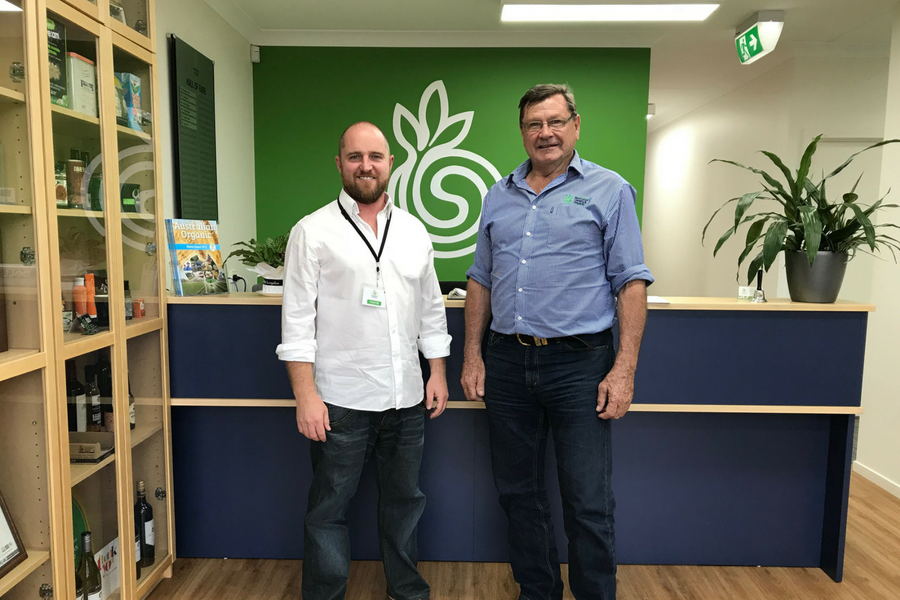After years in the Sydney rat race, Heath and Melissa Donald decided in 2016 that, with a baby on the way, the time was right to make the move to the idyllic Byron Bay.
Though one could be forgiven for thinking a move with a baby on the way was already more than enough to handle, the pair didn’t stop there, buying food delivery business Munch Crunch Organics.
Founded by ‘Farmer Al’ in 2008, Heath said the business was “ahead of its time” in merging online and organic food sales.
“We saw an opportunity to grow this small delivery service into a subscription delivery service for an entire community. We knew we weren’t the only ones craving a more mindful lifestyle. Demand for local, organic produce is on the rise, and we want to completely change the way people perceive and receive Certified Organic fresh produce,” he explained.
The vision for the business, Heath said, isn’t to compete against the big retailers – which is probably for the best; Woolworths reported a half-year profit of almost $1 billion earlier this year – but rather to provide a sustainable and affordable model to meet demand for produce.
“People perceive Certified Organic produce as expensive, but an unnecessarily flawed system with food wastage, massive infrastructure costs, market manipulation, and a huge reliance on imports are driving up costs. This system affects everyone; the farmers, industries, communities, and customers,” Heath explained.
The Munch Crunch Organics answer is a model based on community supported agriculture (CSA), or the idea of subscribing to a particular farmer to get quality local produce.
“Traditionally CSAs are a one-to-one relationship between a farm and a customer, but our model allows multiple farms to combine for greater supply and diversity of produce,” Heath said.
“Most people buy the same thing each week and food diversity is a real challenge for most households. We faced this same problem and our vision is to address this, providing greater food diversity, greater quality, and cheaper bulk prices at the same time.”
Currently servicing customers from Ballina to Brisbane and expansion into the Sunshine Coast coming soon, Munch Crunch Organics works with local farmers who have a current Certified Organic Certificate and “plan to maintain it”, Heath explained.
From here, the business works with farmers to develop a seasonal crop plan.
“We know week to week what we are going to order – within five to 10 per cent – 12 weeks in advance. We don’t guess, it’s all informed by the data and regular forecasting. Our crop plan means farmers are not picking produce and hoping to sell it – they harvest exactly for our member base’s demand,” Heath said.
The food waste problem is a big one in Australia, with the government estimating it costs the nation’s economy $20 billion each year. According to statistics compiled by OzHarvest, four million tonnes of food ends up as landfill each year: one in five shopping bags ends up in the bin, equating to $3,800 worth of groceries per household each year.
As it looks to combat wastage, Munch Crunch Organics has orders are processed on Thursdays, with the business sending two orders to farmers for two harvests the following week. Produce, in turn, is then delivered to customers within 48 hours of harvesting.
The consistency for farmers is key, Heath believes, and an easy attraction to the platform.
“We pay them more than wholesale, we are consistent in our weekly purchasing for the entire season, and we can pay promptly on delivery [which is] music to their ears. This is virtually unheard of in the farming industry as most farmers don’t know what price the market will pay and when they will get paid, which in many cases can be up to 90 days,” he said.
Munch Crunch Organics has three core offerings, or ‘packs’: a fruit and vegetable pack, vegetable only, and a meat pack. Each starts from $65, with customers able to add extras such as milk and eggs to each. According to Heath, the direct farmer network is paid up to 50 percent of the retail dollar.
“The rest [is] used to cover operational costs and plans for further functionality. The industry average sees less than 10 percent of the retail dollar for conventional produce going to the farmer,” he explained.
The Munch Crunch Organics model is underpinned by technology, ensuring that the business can meet its promise of providing farmers with timely payment.
“Stripe’s infrastructure powers the backend of our subscriptions and was vital in getting our vision for Munch Crunch Organics humming in a few weeks, with Stripe up and running as our payments gateway within 24 hours,” Heath said.
Originally outsourcing its development, the business eventually brought development in house to ensure it is continuously investing in the user experience for both sides of its marketplace.
For Heath, the company’s target market is broad: families, couples, and singles who are “genuinely interested in the source of their produce”.
Figures show this market is growing steadily, worth $2.4 billion with the retail market worth an estimated $1.6 billion.
According to a report from Australia Organic, based on a survey of 1,000 Australian grocery shoppers conducted by Mobium Group, more than six in 10 Australian households buy organic products in any given year, with 12 percent putting around 40 percent of their annual grocery spend towards organic products.
“We find as someone’s food appreciation matures, they become more interested in knowing where it came from and the specific certification around its quality,” Heath said.
With expansion into the Sunshine Coast imminent, Heath said the big goal for Munch Crunch Organics over the next year is to grow to connect 50 farmers with 5,000 households.
“We also have big expansion plans to grow nationally. In short, watch this space.”
Image: Heath Donald and Ben Copeman, CEO of Australian Certified Organic. Source: Supplied.




















Trending
Daily startup news and insights, delivered to your inbox.